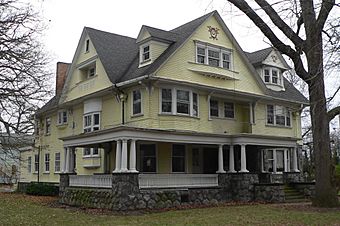Edward D. Libbey House facts for kids
|
Edward D. Libbey House
|
|
|
U.S. Historic district
Contributing property |
|
 |
|
| Location | 2008 Scottwood Ave., Toledo, Ohio |
|---|---|
| Area | less than one acre |
| Built | 1895 |
| Architect | David L. Stine |
| Architectural style | Shingle Style |
| Part of | Old West End District (ID73001503) |
| NRHP reference No. | 83004379 |
Quick facts for kids Significant dates |
|
| Added to NRHP | May 4, 1983 |
| Designated NHL | May 4, 1983 |
| Designated CP | March 14, 1973 |
The Edward D. Libbey House is a special historic home in Toledo, Ohio. It was built in 1895 and was once the home of Edward Libbey (1854-1925). Edward Libbey was a smart businessman who completely changed how glass was made in the United States. This house was recognized as a National Historic Landmark in 1983 because of its importance. Today, a group that works to protect old buildings owns and takes care of it.
Contents
What is the Edward D. Libbey House?
The Edward D. Libbey House is found in the Old West End District in Toledo. You can find it at the corner of Scottwood Avenue and Woodruff Avenue. This house is a great example of the Shingle style of architecture. It was designed by architect David L. Stine and finished in 1895.
A Look at the House's Design
The house has 2-1/2 stories, which means it has two full floors and a smaller half-floor, usually in the attic. Its base is made of strong fieldstone and brick. The outside walls are covered with wooden shingles, giving it a unique look.
The Shingle style is known for its "asymmetrical massing." This means the house isn't perfectly balanced on both sides. It has different sized gables (the triangular parts of the roof) and parts that stick out or are set back. There's also a welcoming porch supported by groups of Tuscan columns. These columns are simple and classic, adding to the house's charm.
Edward Libbey: The Glass Innovator
Edward Libbey was born in Massachusetts. He learned all about making glass at the New England Glass Company. In 1888, he moved to Toledo, Ohio. There, he started a new glass factory with some of his old co-workers.
How Glassmaking Changed
Edward Libbey worked with a clever inventor named Michael Joseph Owens. Together, they completely changed how glass was made. They created amazing machines that could automatically produce all kinds of glass products. This included things we use every day, like light bulbs, bottles, glass tubes, and even window glass. Libbey eventually started several different companies to support these new ideas and inventions. His work made glass products much easier and cheaper to produce.
Preserving History
Edward Libbey lived in this house until he passed away in 1925. This house is the only important building still standing that is directly connected to his life. After he died, it remained a private home until 1965. Then, the Toledo Society for the Handicapped bought it. Later, a nonprofit group took over ownership. This group is dedicated to making sure the house is protected and preserved for future generations to learn from.
Gallery
 | Janet Taylor Pickett |
 | Synthia Saint James |
 | Howardena Pindell |
 | Faith Ringgold |










